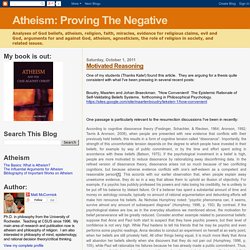

Imported from Google Notebook - Belief perseverance. Atheism: Proving The Negative: Motivated Reasoning. One of my students (Thanks Kate!)

Found this article. They are arguing for a thesis quite consistent with what I've been pressing in several recent posts: Boudry, Maarten and Johan Braeckman. "How Convenient! The Epistemic Rationale of Self-Validating Beliefs Systems. forthcoming in Philosophical Psychology. One passage is particularly relevant to the resurrection discussions I've been in recently: According to cognitive dissonance theory (Festinger, Schachter, & Riecken, 1964; Aronson, 1992; Tavris & Aronson, 2008), when people are presented with new evidence that conflicts with their previously held beliefs, this results in a form of cognitive tension called “dissonance”. A classic illustration of cognitive dissonance can be found in the landmark study by Leon Festinger and his colleagues, who infiltrated a doomsday cult and observed the behavior of the followers when the prophesized end of the world failed to come true(Festinger, et al., 1964). Religion: Atheism.
Atheist Websites. Atheist Communities. Neil deGrasse Tyson: Atheist or Agnostic? With rendition switcher Neil deGrasse Tyson : I'm often asked – and occasionally in an accusatory way – “Are you atheist?”

And it’s like, you know, the only “ist” I am is a scientist, all right? I don’t associate with movements. I'm not an “ism.” I just - I think for myself. So what people are really after is, what is my stance on religion or spirituality or God? There are many atheists who say, “Well, all agnostics are atheists.” And some will say, well, that’s – "You’re not being fair to the fact that they’re actually the same thing. " And it’s odd that the word atheist even exists. Directed / Produced by Jonathan Fowler & Elizabeth Rodd. God is Imaginary - 50 simple proofs. Proof #3 - Look at historical gods The belief in "god" seems to be ubiquitous through the ages.

We know, for example, that the ancient Egyptians believed in their gods so fervently that they built massive structures like the Great Pyramid -- still today one of the largest and most enduring human constructions ever created. Despite that fervor, however, we know with complete certainty today that the Egyptian gods were imaginary. There is no evidence of their existence. Thus we do not build pyramids anymore and we do not mummify our leaders. More recently we know that tens of millions of Romans worshiped Jupiter and his friends, and to them they built magnificent temples. Much more recently, we know that the Aztec civilization believed in their gods so intensely that they constructed huge temples and pyramids. Today's "God" is just as imaginary as were these historical gods. The "God" and the "Jesus" that Christians worship today are actually amalgams formed out of ancient pagan gods.
Dawson-When-Prophecy-Fails-and-Faith-Persists.pdf. Gentle Godlessness. Atheism Blogs. What is Atheism Really All About? "He who decides a case without hearing the other side, even if he decides justly, cannot be considered just" -- Seneca What is an Atheist?

An atheist is a person who does not believe that any gods exist. Why don't you believe in God? There is simply no more evidence for Jehovah than there is for Zeus. Christians find no reason to believe that Zeus exists, so they do not believe in him. Don't you want to go to heaven? I do not believe there is a heaven. How can you turn your back on true happiness? I cannot imagine being happier than I have been already. How can you trust sinful humans, ignoring all the good god does? It offends me that an invisible god is given credit for every good thing that happens in the world, while every evil is blamed on humanity. Not all human beings are evil. And so, when a doctor saves someone's life, we truly owe our thanks to the doctor, and the society that made her education possible.
If there is no god, then where do you think the universe came from? 13 Books Atheists Should Consider Reading. These are not books debunking creationism, nor an item-by-item critique of the factual plausibility of holy writings, nor a demonstration of their historic shortcomings when compared to current notions of progressive humanist morality, nor are they an overt attack against religion.

Since you are already an atheist, I assume you don’t need convincing anymore. Rather, they are about understanding your world and yourself without religion. These ideas are not new. Generally speaking, they are not trying to convince the reader. They are proposals for a different way of understanding reality without a god, logic, ethics, morality and yourself – perhaps the hardest thing to objectively fully understand in life.
I have read all of them, many more than once, but not in the original language. The Presocratic Philosophers: A Critical History with a Selection of Texts by G. Gentle Godlessness.